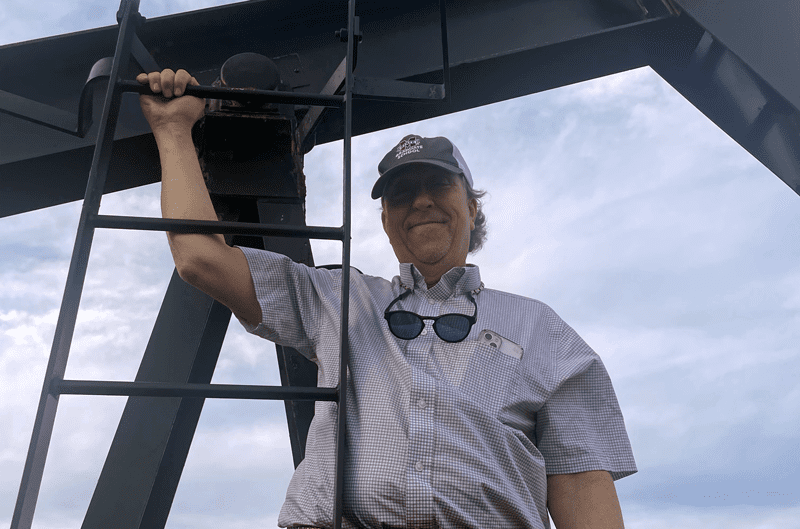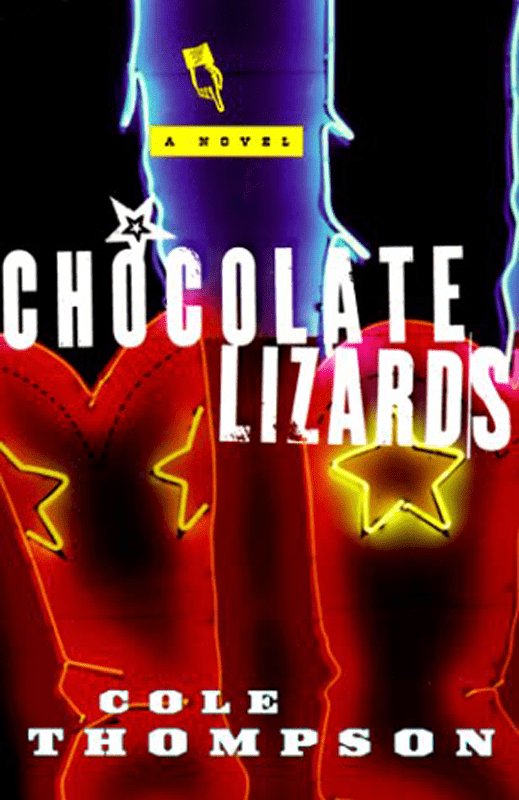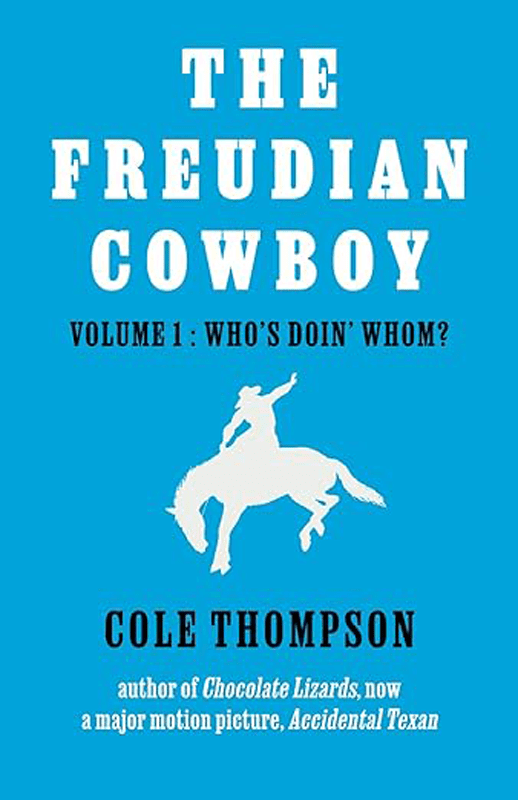“I used to be in the oil business. I’ve been teaching college English now for about 20 years. I got lucky and got a full time job at McMurry University here in Abilene as a creative writing teacher. It’s exciting and it fits better with my true self.
My father, John R. Thompson, graduated from Oklahoma University with a petroleum engineering degree in 1951 and went to work for Schlumberger. They moved him to Abilene in 1952, and my parents settled here. My dad worked for Schlumberger logging wells and he was a salesman, then he decided he would become an independent operator in the ‘60s by the time I was born. He was a very active independent operator from the late ‘60s into the 2000s. It’s funny; he’s 95 and we’re about to drill a well here in a few weeks.
When I was a kid, I would go out with him to one of the rigs to look at the log or do whatever aspect of the process he was involved in. My father was also part owner in a supply store called BT Supply here in Abilene and I worked there when I was 16, so I was raised in the oil field and I got to know all those characters.
My dad always has these stories…There’s one about some guy out in Albany about 40 miles from Abilene. He needed to log his well with Schlumberger. This was in the ‘60s and he went to the payphone in Albany and called the Abilene operator. He said, “I need the phone number for Schlumberger.” She said, “Can you spell that?” He said, “Lady, I could walk to Abilene before I could spell that!”
In school, I was a golfer and I went to Stanford to play golf, and realized I had a fascination with language. It took me a while, but I got a master’s degree in English at the University of Louisiana Lafayette and, about that time, I decided I wanted to write a novel. I grew up playing golf, so I wrote a novel about golf. It had problems, but there was also some talent in there, so I got an agent named Jane Jordan Browne from Chicago. We sent the manuscript around everywhere, but it never sold, so I got frustrated and said, “I give up. I’m gonna quit.” And then I sat up in bed, maybe that same night, and said, “No, I’m not,” and I just came up with this idea for Chocolate Lizards. The heart of the story is fighting for your dream.
Merle’s character is sort of based on my landlord, James Eggleston, in Louisiana, whose father worked for Getty Oil Company. James also had been working for Getty in Louisiana since he was about 16. He was kind of a world class – he called himself a “spy.” He would go offshore to represent a company that had a big interest in the well to make sure that everything was being done right. He was very knowledgeable about the oil business, but he was a real character. Merle is primarily based on James.
Jane, my agent, really liked it and we sent it off. It’s one of those fortunate things that a young editor at St. Martin’s Press had a fascination with Texas. It went across her desk and she read it and saw something in it.
I was driving to Supercuts one day to get a haircut and my agent called and said, “They’re going to publish your book,” which was real exciting. It came out in 1999 but, before it was even published, I had movie people who were interested in it. When I wrote it, I kind of thought of it and saw it like a movie.
Abilene screenwriter and producer Julie B. Denny took over and we would renew my option every six months, I think. I bet we met at her dining table in her house 15 times. I didn’t think the movie would ever really happen and then, all of a sudden, she said, “I hired a casting director.” I love the director, Mark Bristol. He became fascinated with film and storyboarding as a child, and has done storyboarding for Tom Cruise’s films, so I knew that he had the talent to make a good movie.
Julie got it into Thomas Haden Church’s hands and he really liked it. He spent some time working in the oil field as a young person. Once you get the principle involved, everything starts falling into place very quickly. I was astounded.
I knew they were filming in Bartlett, Texas, but I’m kind of shy and I wasn’t going to go down there. The next day Julie calls and says, “Hey, somebody wants to talk to you,” and it was Rudy Pankow [who plays Erwin]. He said, “I’ve never met the author of the original material of anything I’ve ever been on, and I really would like to meet you.” So, I said, “I’ll be there tomorrow.” My wife and I went and it was a great experience.
They were shooting a really important scene, where they’re outside Merle’s house in the back grilling steaks and, at that point, they basically agreed that “Harvard” [Erwin’s nickname] is going to stay and help him, and so it was a fun scene to watch. Rudy’s just so down to earth; he’s a genuinely sweet young man. I really got a kick out of talking to him and I got to meet Thomas Haden Church, as well.
At some point during the screenplay writing process, I realized there were too many cooks in the kitchen. I really had a lot of faith in Julie and Mark, and I saw how instrumental Koen was in helping Julie write some of the scenes. They really made a big change with the female lead [café owner Faye, played by Carrie-Anne Moss] – in the book she’s a prostitute from Dallas – and I just said, “Do whatever you need to do in order to make the story work for y’all.”
When it was done, my agent sent a screener, and we went down to my in-laws south of Brownwood. They have a huge TV and we all watched it together. I was crying in the end. The book is not very sentimental at all; the movie has a lot more heart. I was just so ecstatic about it, I texted Julie and said, “Now it’s our story.”
– As told to Rebecca Ponton
Headline photo: Author, Cole Thompson. Photo courtesy of Lori Thompson.
Excerpt: Chocolate Lizards
By Cole Thompson
“Hell, son. The public library ain’t got this kind uh dope. This is a geology library. Now here’s whatchur gonna do. Yer gonna read these here magazines, along with anythayng else we can find in here tonight, then yer gonna tell me what’s the best way to start goin’ about lookin’ fer oil.”
“Me?”
“Yep.”
“Merle, are you nuts? I’m a drama student from Boston, Massachusetts. I don’t know the first thing about prospecting for oil.”
“Harvard.”
“What?”
“Lemme tell ya somethin’.”
In the pitch darkness I hear the tiny scraping noise of his flask cap being unscrewed.
Gulp.
He takes a swallow and a blast of whiskey breath hits my nose.
“It’s clear as day yer a smart sumb*tch, butchoo got a bad habit.”
“Oh yeah. What?”
“Ya like to sell yerself short.”
“Aw, c’mon, Merle. Get real. You’ve been in this business for years. How in the hell can I help you?”
Gulp.
Another swallow.
“I’m gonna tell ya one more time, boy. I’m a roughneck. They call me up and say, ‘Merle, we got a location staked out ‘ere a half mile south uh the road, go drill down to seven thousand feet.’ And ‘at’s what I do. Rig up and drill it. Now why the hell they decided to put ‘at stake there, I ain’t got no idea. Understand? Hell, I cain’t even hardly write my own damn name, let alone read a bunch uh books.”
“Okay, fine. That still doesn’t change the fact that I’m – ”
“Hey!”
He pauses and swigs his flask.
Gulp.
“You listen here, boy. ‘Ere’s a reason you showed up in town when ya did. The Lord sentchoo to me. Yer my savin’ angel. Ya got ‘at Harvard education and ya turned up right when they’re fixin’ to kick my teeth in. And yer gonna help me.”
I roll my eyes in the dark. This guy’s brain is fried on Jack Daniels.
“Merle.”
“Yep.”
“I’m not an angel. I promise. I’m just a mortal guy. A mortal Yankee guy stranded in town.”
Gulp.
I hear the cap being screwed back on his flask, then suddenly his hand gropes out of the darkness and grabs the top of my head. He squeezes my head as though palming a basketball.
“Hey, boy. I worked my whole life to get my rigs, and I got less’n thirty days ‘fore they jerk the rug out from under me.” He squeezes my head harder. “Thirty days. Now I know this don’t make sense to ya but ’at’s all I got left, is what don’t make sense. Now let’s cut the bull and get to work. I ain’t payin’ ya a hunerd dollars a day to stand ‘ere and bellyache.” He flicks on the flashlight and lays it on the table by the magazines. “I wancha to read through these damn things and tell me whatcha thank.”
I look at the flashlight and stack of journals. I want to run out the door, down the alley, and keep running. Merle’s a lunatic. I mean, this is just great. I can just see getting busted for breaking and entering in Abilene, Texas. And, even if we aren’t caught, what the hell does he want me to do? I know zip about geology and oil. [Geez.] My toes burn inside my boots. I wiggle them and tap my heels on the floor, trying to jog my feet back up out of the narrow toes. I sigh and shake my head. Well, what can I do? I can’t just run out into the night. And, hell, at least I’m being paid a hundred bucks a day. I pick up the flashlight.
“All right, Merle. I can’t see what good it will do. But I’ll read for you.”
He pats my back.
“Attaboy.”
Excerpted with permission. [Clean version. Edited for profanity.] Chocolate Lizards by Cole Thompson (St. Martin’s Press; First Edition. March 15, 1999). Reissued as Accidental Texan: A Novel (St. Martin’s Press; First Edition. April 1, 2007.)
Excerpt: The Freudian Cowboy
By Cole Thompson
When Dr. Whitlatch came out to the edge of the stage
(or the dais, as she called it) and leaned down and placed
our course syllabus copies there in a stack,
I was, I confess, admirin’ how, amid her open
shawl, her tight red shirt fit her in manner
of topographically exact,
and she said, “Welcome to this course in Literary Theory, in which
we’ll survey various approaches to reading and responding
to literature – and, indeed, to any text at all,
and, in which, as one trained in Critical Theory, I’ll insist
you foreground your theoretical position and, thereby,
preempt any ideological thrall.
“So,” she said, “according to this prerequisite for responsible
and constructive discourse, let me begin by foregrounding
my theoretical position for you.
I’m a continental feminist, and from a stance of post-
Structural Marxism, I resist the assault on the feminine
in what I say and do.
“And by post-structural Marxist,” she said – then she elaborated
on her existence and the epistemology of language and how,
in the state, the two cross.
I understood none of it, but as she grew more adamant,
I felt more attracted, and in some kanky’ fantasy,
I thought, Whatever you say, boss.
Oh yeah, as she foregrounded her theoretical
position, I imagined her in a theoretical position,
as well – à la cowgirl on top –
but then she warmed up further in her fore-
ground of feminism and caused my
je ne sais quoi to stop.
“…Which some have called militant,” she said, “but that appellation
in itself – okay,” she said. She stopped walkin’ across the dais and,
apparently, looked right down at me on the second row.
“I must say,” she said, “I’ve yet to see a student in a cowboy hat.
Let me ask, do you feel entitled to subjugate animals, not to mention
women, when you dress for a rodeo?”
Now that she was referrin’ to a cowboy hat, I realized, godd*m,
she was talkin’ to me, cuz of those students in western
fashion, I was alone;
and, yes, I felt a lil’ hurt, cuz as I’ve described,
I was enamored and fantasizin’ about us venturin’
into the romantic zone;
however, I was also insulted, bein’ criticized like ‘at in front
of my classmates, so I pushed up my front brim and answered.
“Ma’am,” I said, “I beg yer pardon,
but my whole life I’ve had my a** kicked by animals
and women, so why doan’choo just plant ‘at in yer lil’
foreground garden.”
From up ‘ere on her dais, she stared down at me, cuz I
imagine she was shocked by both the candor
and blunt cynicism of my reply;
plus, insofar as she was from Harvard and Berkeley,
I was prob’ly the first West-Texas sumb*tch on whom
she’d given her feminism a try.
“Well,” she said, “yer alleged oppression notwithstanding,
you must know your hat is a patriarchal fetish propagated
by its cultural function as a metonymic icon.
And given the virulence of your persona, I imagine, what –”
She gestured to the seat-back in front of me. “You also have
the boots totemically on?”
Now, while I only understood about ten-percent of what she
was sayin’, I inferred she was faultin’ me fer havin’ the hat
of a cowboy on my head,
and was contemptuously predictin’ I’d also have on boots;
but if she thought I’d be ashamed, by God, she was in
fer some how-‘bout-tiss’ instead.
Excerpted with permission. The Freudian Cowboy by Cole Thompson (Firmament to Fin; February 28, 2024).
Oil and gas operations are commonly found in remote locations far from company headquarters. Now, it's possible to monitor pump operations, collate and analyze seismic data, and track employees around the world from almost anywhere. Whether employees are in the office or in the field, the internet and related applications enable a greater multidirectional flow of information – and control – than ever before.





